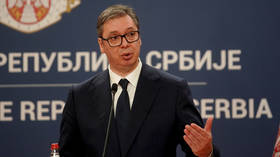Kremlin clarifies Putin’s comments on gaspipe attacks
The Russian president’s words were misinterpreted by the media, according to spokesman Dmitry Peskov
In his speech on Monday, Russian President Vladimir Putin was speaking about Kiev’s attempted attacks on Russian ships that are protecting gas pipelines in the Black Sea, not the pipelines themselves, Kremlin spokesman Dmitry Peskov has clarified.
Speaking to journalists on Tuesday, the Kremlin official said that the media had wrongfully interpreted the president’s words and that he did not mention any direct attacks or attempted strikes on the Blue Stream and Turkish Stream pipelines.
“The president spoke about attacks on the ships that guard these pipelines,” Peskov said, adding that all of these attacks have been successfully repelled.
The clarification comes after Vladimir Putin stated during a press conference on Monday that ships protecting Russian pipelines transporting natural gas to Türkiye were under constant attack by submarine drones that were being launched from Ukrainian Black Sea ports.
The Russian Defense Ministry reported in May that it had repelled a Ukrainian attack on the Ivan Khurs – a vessel that guards the two pipelines. The incident involved three unmanned speedboats, which were destroyed 90 miles (145 km) northeast of Türkiye’s Bosporus Strait, the ministry said.
Putin noted that such attacks – as well as Kiev’s continued use of Black Sea humanitarian corridors for military purposes – were one of the reasons Russia terminated its participation in the so-called Black Sea Initiative.
The treaty was supposed to facilitate the export of Ukrainian grain to developing countries in exchange for lifting sanctions on Russian agricultural products. However, Moscow indefinitely abandoned the agreement in mid-July, claiming that the West had failed to uphold its end of the bargain and had lied about the humanitarian goals of the deal. Putin stated on Monday that the latest data indicated most of the grain ended up in wealthy countries, particularly in the EU, and only 3% of the shipments reached the poorest nations in the world.
Nevertheless, Putin stated that Russia would consider returning to the deal if the West were to fulfill its obligations and lift sanctions on Russian fertilizer and other agricultural products.
Putin has also vowed Moscow will continue exporting food and fertilizer in an effort to improve and stabilize the global agricultural industry, adding that Moscow is also already in talks with Qatar and Türkiye about sending Russian grain for processing for the subsequent delivery of flour to developing countries.






Comments are closed.